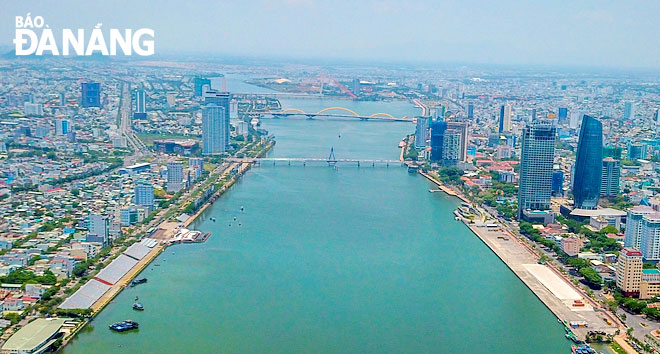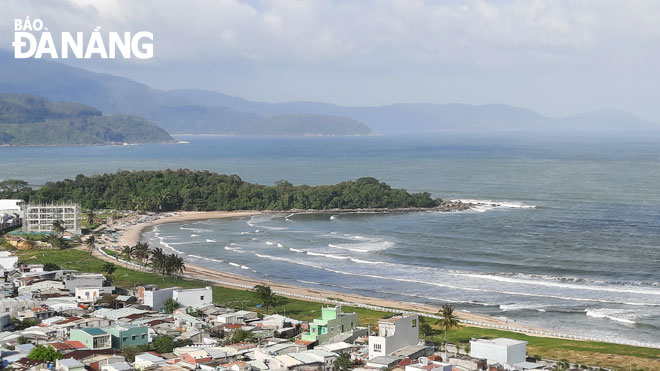Da Nang to be designed with 2 'economic belts', 12 functional sub-divisions
In line with the Prime Minister-approved adjustments to the strategic master plan for major developments in Da Nang to 2030, with a vision to 2045, Da Nang will develop two so-called ‘economic belts’ and 12 sub-divisions with the aim of boasting a new aesthetically-appealing and modern facelift to the city in the future.
 |
| Subdivision along the Han River and its eastern bank’ will become the city centre |
As for the two ‘economic belts’, one is the northern part boasting high-tech industry and seaport- logistics, and the other is the southern part showing off innovations and high-tech agriculture.
Meanwhile, 12 sub-divisions will be in the making.
In detail, ‘Subdivision along the Han River and its eastern bank’ will include the area along the two banks of the Han and Co Co rivers, along with the eastern bank bordering Da Nang Bay and the northern Son Tra Peninsula to the north, Le Do - Nguyen Huu Tho - Vo Chi Cong - Co Co River (Dong No western branch) to the west, Quang Nam Province to the south and the sea to the east.
This subdivision will encompass some parts of Thanh Khe, Cam Le and Hai Chau districts, the whole Ngu Hanh Son and Son Tra districts (except for the Son Tra Peninsula). This subdivision will be developed into a ‘compact city’ model, focusing on developing trade, services, and tourism.
On the spotlight will be the central square associated with the municipal Administrative Centre, software parks, the sport-cultural facilities around the Tien Son area, a living museum complex, pedestrian promenade along Bach Dang Street associated with the expanded APEC Park, a night market and the Nguyen Van Troi walking bridge, a commercial business centre, a financial street, and centres for M.I.C.E, high-quality education and training, and medical services.
‘Subdivision along the Da Nang Bay’ will comprise the coastal area of Da Nang Bay, plus some parts of Thanh Khe and Lien Chieu districts.
Importance will be attached to speeding up urban renovation and reconstruction, becoming a mixed lifestyle featuring area for mid-income residents combined with diversified commercial and recreational activities. The feature of this site is to develop tourism and sea-based entertainment along the coast of the Da Nang Bay.
‘Lien Chieu Seaport Subdivision’ will consist of some parts of Hoa Hiep Bac and Hoa Lien communes in Hoa Vang District stretching along Cu De River. The landmarks of this site will include the Lien Chieu Port, a logistics cluster, and a seaport urban area.
‘High-tech Subdivision’ will consist of Hoa Khanh Bac and Hoa Hiep Nam wards in Lien Chieu District and a part of Hoa Vang District.
 |
| ‘Lien Chieu Seaport Subdivision’ will consist of parts of Hoa Hiep Bac and Hoa Lien communes in Hoa Vang District stretching along Cu De River. |
The subdivision will be designed with hi-tech zones, existing industrial parks (IPs), and new ones along with the Northern Coach Station, with orientations on developing high-tech, clean, environmentally - friendly, sustainable and modern industries, along with large public spaces.
The ‘Green Core Subdivision’ will be characterised by green landscapes along Phuoc Tuong - An Ngai ranges, the North-South expressway, a high-speed railway and a new railway station.
This subdivision will feature the construction of parks and urban functional venues, mid-ranged residential areas and new public green-covered spaces.
‘Innovation subdivision’ is bounded by the National Highway 14B to the north, Da Nang - Quang Ngai expressway and national highway 1A to the west, Vo Chi Cong Street to the east, and Quang Nam province to the south.
The site will boast such landmarks as the Da Nang university urban area, innovation centres, software parks and international hospitals, the Hoa Xuan sports complex, and the Southern Coach Station.
‘Airport Subdivision’ is concentrated around the Da Nang International Airport, bounded by the Dien Bien Phu Street to the north, Truong Chinh to the west, Nguyen Huu Tho to the east; Cach Mang Thang Tam to the south.
The subdivision will consist of a new modern airport and a logistics cluster. The goal is to maximise the airport's potential as a logistics hub, in tandem with developing the airport’s central location into a major public hub in Da Nang.
‘Urban Hillside Subdivision’ will border DT602 road to the north, Hai Van southern bypass to the east, parts of Highway 14G and Ba Na - Suoi Mo route to the south.
The spotlight of this subdivision will be the development of a green space distributed along the western mountainous area, high-rise buildings of up to 25 storeys, with high land use coefficient and low construction density to ensure visibility towards mountains to the west.
‘High-tech Agricultural Subdivision’ is located in the city’s southwestern part, along the Western Belt route, comprising Hoa Phu, Hoa Phong, Hoa Khuong and Hoa Nhon communes in Hoa Vang District. The focus of this subdivision will be place on forming a hi-tech agricultural zone.
‘Development Reserve Subdivision’ is bounded by a part of the Ba Na - Suoi Mo route to the north, National Highway 14G, and Cam Le River to the north, Quang Nam Province to the south, National Highway 1A to the east, and the ‘High-tech Agricultural Subdivision to the west.
This subdivision is reserved for the development in the 2030 – 2045 period. The site will boast the renovation and embellishment of rural residential areas and the existing agricultural production areas.
‘Western Ecological Subdivision’ will be the entire mountainous area to the north and west of the city, stretching from the Bach Ma - Hai Van maintain range and Hon Chao in Hoa Hiep Bac Ward, Lien Chieu District through the communes of Hoa Bac, Hoa Lien Hoa Ninh, Hoa Phu and Hoa Khuong in Hoa Vang District.
The subdivision will feature biodiversity, natural landscapes and reservoirs to ensure sustainable development, with the development of high-class resorts, adventure tourist attractions, and eco and community-based tourism services associated with mountain-sea ecosystems.
‘Eastern Ecological Subdivision' will encompass Hoang Sa District. In particular, the Son Tra Peninsula is oriented to be a national tourist area housing spiritual destinations and eco-resorts in a bid to fully tap cultural, historical and characteristic monuments of sea - mountains - forests setting to ensure a balance between biodiversity conservation and sustainable development.
Reporting by TRIEU TUNG – Translating by A.T